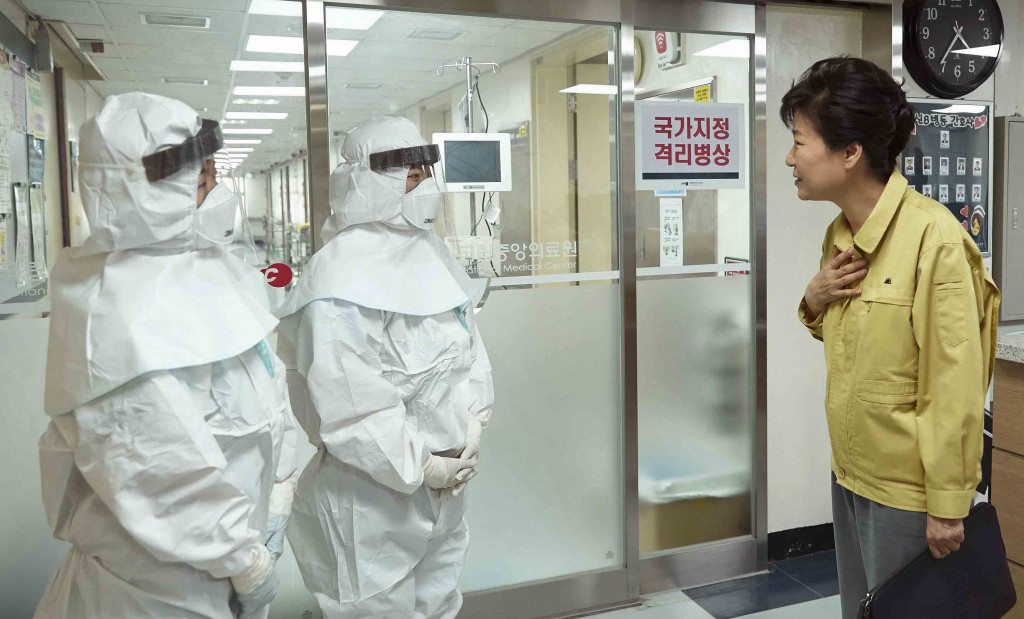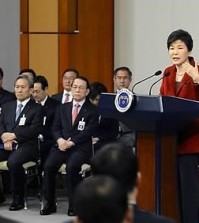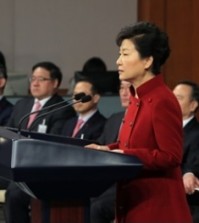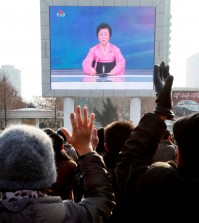- California Assembly OKs highest minimum wage in nation
- S. Korea unveils first graphic cigarette warnings
- US joins with South Korea, Japan in bid to deter North Korea
- LPGA golfer Chun In-gee finally back in action
- S. Korea won’t be top seed in final World Cup qualification round
- US men’s soccer misses 2nd straight Olympics
- US back on track in qualifying with 4-0 win over Guatemala
- High-intensity workout injuries spawn cottage industry
- CDC expands range of Zika mosquitoes into parts of Northeast
- Who knew? ‘The Walking Dead’ is helping families connect
President Park delays US trip due to MERS

South Korean President Park Geun-hye, right, talks with health care workers wearing protective gears as she visits the National Medical Center housing MERS, Middle East Respiratory Syndrome, patients in Seoul, South Korea, June 5, 2015. Sales of surgical masks surge amid fears of the deadly, poorly understood virus. Airlines announce “intensified sanitizing operations.” More than 1,100 schools close and 1,600 people – and 17 camels in zoos – are quarantined. The current frenzy in South Korea over MERS brings to mind the other menacing diseases to hit Asia over the last decade – SARS, which killed hundreds, and bird flu. (Yonhap)
SEOUL, June 10 (Yonhap) — President Park Geun-hye delayed a U.S. visit that was scheduled for this weekend, Cheong Wa Dae said Wednesday, amid the spread of the MERS virus that has killed nine South Koreans.
The move is “designed to take care of public safety, including putting a quick end to MERS,” chief presidential press secretary Kim Sung-woo told reporters, referring to the Middle East Respiratory Syndrome virus.
Park has delayed the trip as “the people’s safety is the top priority,” and she will try to ease public concern at home, Kim said.
The move underscored her commitment to containing the virus amid public criticism that the government has responded poorly to the outbreak of the virus.
This week is considered a critical period to assess whether the virus can be contained or will continue to spread.
So far, the virus has killed nine people and infected 108 others since it was first confirmed on May 20.
All transmissions so far have occurred at hospitals.
Park has given full authority to a task force, composed of medical experts, to manage the outbreak, visiting the National Medical Center, a state-designated hospital for infected patients, in downtown Seoul.
Kim said South Korea and the U.S. agreed to reschedule Park’s trip there at “the earliest mutually convenient time.” No specific time frame has yet to be given.
The agreement was reached in a phone conversation between Foreign Minister Yun Byung-se and U.S. Secretary of State John Kerry earlier in the day.
Park had planned to leave for Washington on Saturday for talks with her U.S counterpart, President Barack Obama, on a broad range of security and economic issues, including the South Korea-U.S. alliance.
The White House said Obama looks forward to welcoming Park “at a mutually convenient time in the future to discuss the U.S.-Korea alliance and the critical role it plays in assuring regional stability and security.”
“As just one example of this partnership, the United States is working closely with our Korean partners to support their response to the MERS cases in South Korea,” said Ali Baskey, a spokesman for the White House’s National Security Council.
Daniel Pinkston, a Korea expert at the International Crisis Group in Seoul, said the decision was driven by domestic politics, adding that the Obama administration will be sympathetic.
“The summit would have made a positive contribution to bilateral relations, but everything will be fine,” he said, noting there are no urgent bilateral issues that require immediate presidential attention.
Park’s decision came as some lawmakers pressed her to delay the trip, saying the president should take the lead in containing the virus outbreak.
The rival political parties welcomed the decision.
Park “considered the psychological impact MERS has had on our society and economy,” said Kim Young-woo, a spokesman of the ruling Saenuri Party. “Her decision made it all the more important that we work together to combat MERS.”
“We hope it builds people’s trust in the government’s response to the MERS outbreak,” said Yoo Eun-hye, a spokesman of the main opposition New Politics Alliance for Democracy.
The decision came amid negative public opinion on Park’s trip.
A poll conducted by polling agency Realmeter showed 53.2 percent said Park should delay the trip while 39.2 percent said Park should go ahead.
The poll’s results were posted on the website of Realmeter, about an hour before the presidential office announced the delay.
The polling agency said it conducted the survey on 700 adults on Monday and Tuesday and had a margin of error of plus or minus 3.7 percentage points.
Park was under fire for visiting the United Arab Emirates, a month after the sinking of the ferry Sewol off the southwest coast on April 16 last year that claimed 304 lives.
She attended a ceremony at the time to mark the installation of a Korean-built nuclear reactor at a power plant under construction in the Middle Eastern state.
















